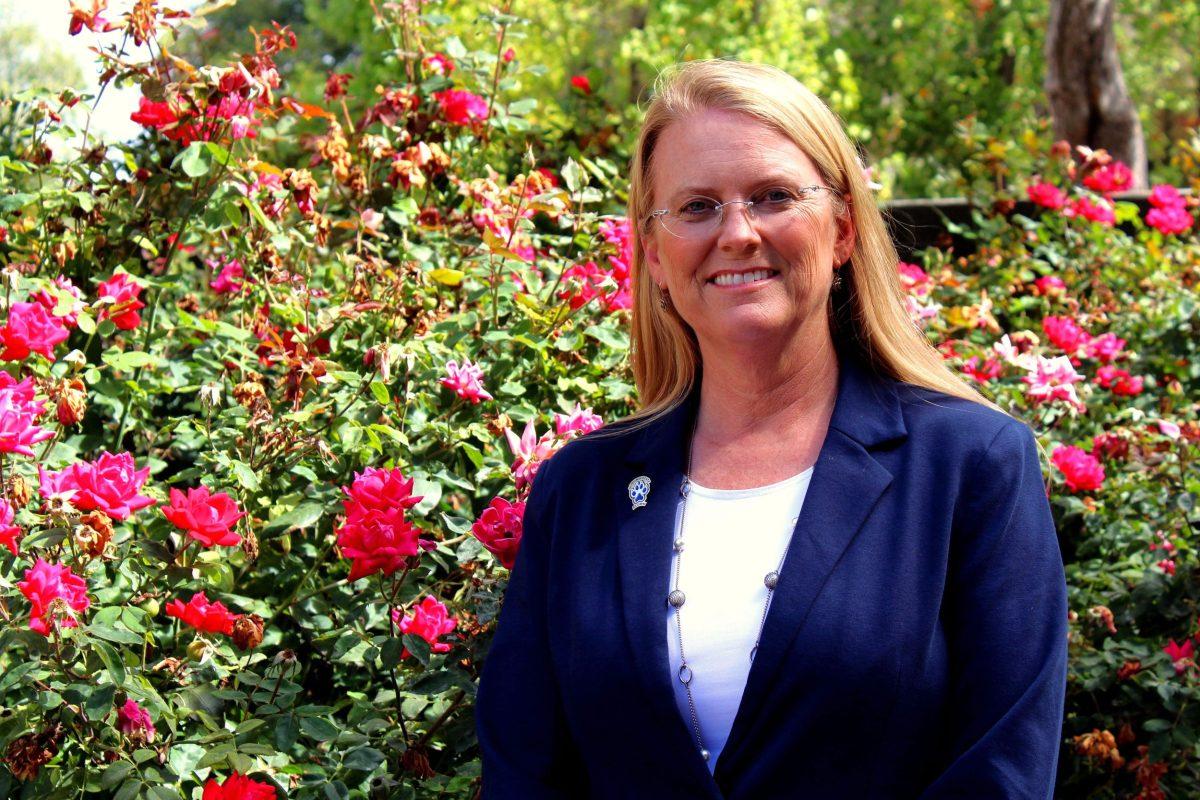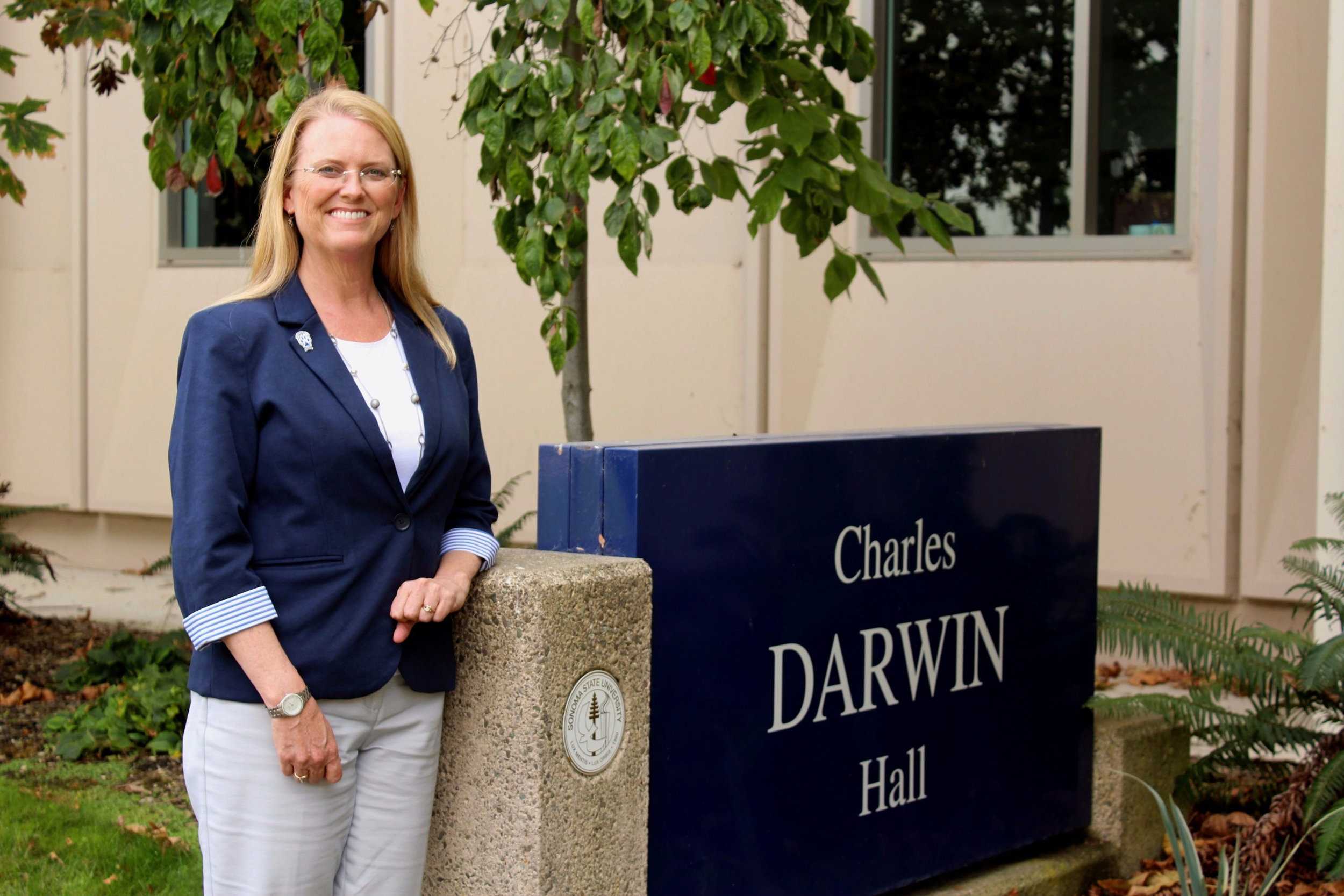Lynn Stauffer, dean of the School of Science and Technology at Sonoma State University and the first female professor in the department of computer science, recently received the Inspiring Leaders in Science, Technology, Engineering, and Mathematics award from Insight into Diversity magazine. After coming to Sonoma State in 1994, she became dean of the School of Science and Technology in 2010. Among the Inspiring Leaders in STEM, award she also received a Woman in Business award. In an interview with Stauffer, she offered some thoughts on her professional accomplishments and what drives her to make a difference in her community and her students’ lives.
STAR: How did you come to Sonoma State?
Stauffer: I earned my doctorate in computer science at UC Irvine and at that time I knew my passion was for education, so I interviewed at several institutions that valued undergraduate education and research and decided on that basis that Sonoma State was the best match with my priorities and values. That was in 1994, I was hired as an assistant professor and was the first female faculty member in the computer science department. Since that time, I would say one of my biggest achievements is being recognized as the recipient of the Excellence in Teaching award in 2006. Then I started serving in this dean role in 2010.
STAR: How did you become interested in the science, technology, engineering, and mathematics field?
Stauffer: This Inspiring Leader award in STEM came about because of that fact that I do a great deal to support students from all backgrounds to be successful in the disciplines that STEM covers. What really motivated me to do more work there is, first off, I am as a female in computer science underrepresented. Women are about 15 to 18 percent of the people in the computer science field, so I had my own experience and background there. As an educator, I wanted to broaden participation, and that came about from having students that are super capable but got overly discouraged from things that were out of their control. I wanted to do everything I possibly could to be supportive to all of those students to be successful. That really is what drives many of my efforts, but it ranges from my first beginnings here. I started the Women in Computer Science Clubsand we continue to get together in the spring at my house for a gathering of alumni, current students, faculty, and staff to really support that community of women in computer science. In 2008, I started the current nationwide Mathematics, Engineering, Science, and Achievement program at Sonoma State, which runs through the University of California’s Office of the President to provide support, development and advancement opportunities for students coming from underrepresented and underserved communities and backgrounds. More recently, I’ve been working to broaden participation for women in STEM and technology because our numbers in engineering and computer science aren’t where we want them to be for women in those majors. I’m also working in the community for Community Women Investing in STEM equity, and that is a partnership with the Career, Technical, and Education Foundation, and we’re working to build the structures that will advance the success of young girls and women in STEM.
STAR: Why do you feel like it is so important to help minorities and underrepresented people in this particular field?
Stauffer: I think the work happening in these fields is incredibly important for the future of our region, state and world. The work is happening in STEM and health is incredibly important. It needs a lot of people to be a part of it. We need to be sure we’re pulling the talent pools, ideas and innovations from the largest group of capable and informed people that we can. That kind of advancement and innovation will be more impactful if we have a broader group weighing in on it.
STAR: As a woman in your profession, what challenges did you face and how did you overcome them?
Stauffer: The challenges varied. The most documented, and I battled this, is a lack of self confidence. It’s often referred to as an “imposter syndrome,” making thoughts such as maybe it was a fluke that I’m here and doing what I’m doing. There is a doubt that creeps in thinking, “Do I belong? Am I good at this?” What you don’t see are many examples of people in your field who look like you and feel like you that makes you question if you belong here. There are also people who will underestimate abilities of women, and I think those people are fortunately declining in numbers or are being educated in understanding that women bring an incredible intelligence, capability and impact for any kind of group.
STAR: Are there any specific examples of this you have experienced?
Stauffer: There have been examples of blatant things, and I’ll give an example. When I was a graduate student, I was very lucky to get pregnant. I go in to talk to my Ph.D. adviser and I say I have good news, I’m expecting a little one. My adviser says, “I’m sorry you’re leaving the program.” There was an automatic assumption that because I was pregnant and a woman, that having a child would mean I would no longer continue as a graduate student. I don’t think that same assumption would have been made if it had been a male sharing that news with their adviser. Is that discrimination? I don’t think so, I think it’s more of a lack of understanding and that there is a real bias against women.
STAR: What does this award mean to you?
Stauffer: It means a great deal to be honored from these efforts that really come from my heart, where my passion is and why I entered education in the first place. With my degree in computer science, there are other ways I could have gone. My passion and desire to work with people who are trying to improve themselves through education and helping to advance their dreams along with my own, means a great deal. Being recognized is very special to me, and I really have dedicated myself to it.
STAR: What advice would you give to people entering your field?
Stauffer: My advice is go for it. “Go for it” means a great deal. It means being willing to put in the hard work it takes to master some of these challenging questions, topics and ideas. It is also relying on the support and partnership of your networks of people that surround you, that is your family, friends, colleagues, fellow students and peers to really propel yourself forward. Dream big.





![[Both photos courtesy of sonoma.edu]
Ming-Ting Mike Lee stepped in as the new SSU president following Sakakis resignation in July 2022](https://sonomastatestar.com/wp-content/uploads/2024/04/CC4520AB-22A7-41B2-9F6F-2A2D5F76A28C-1200x1200.jpeg)



























